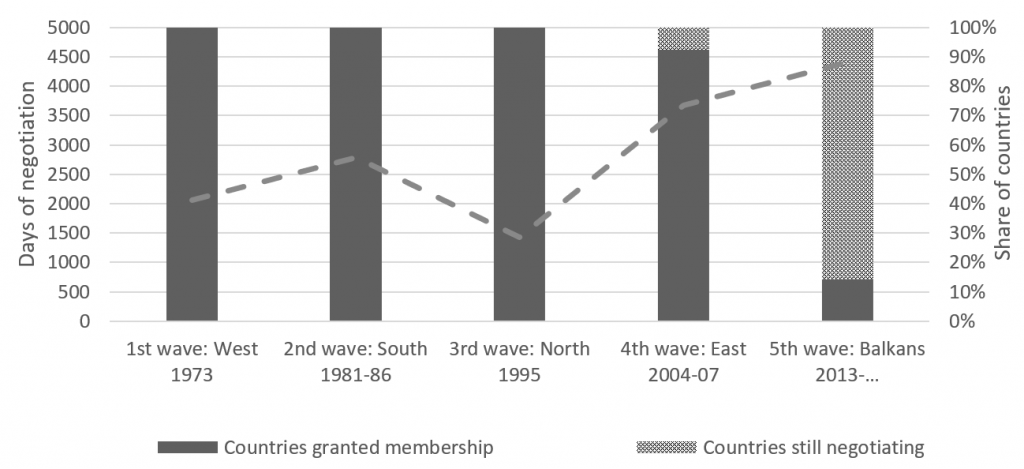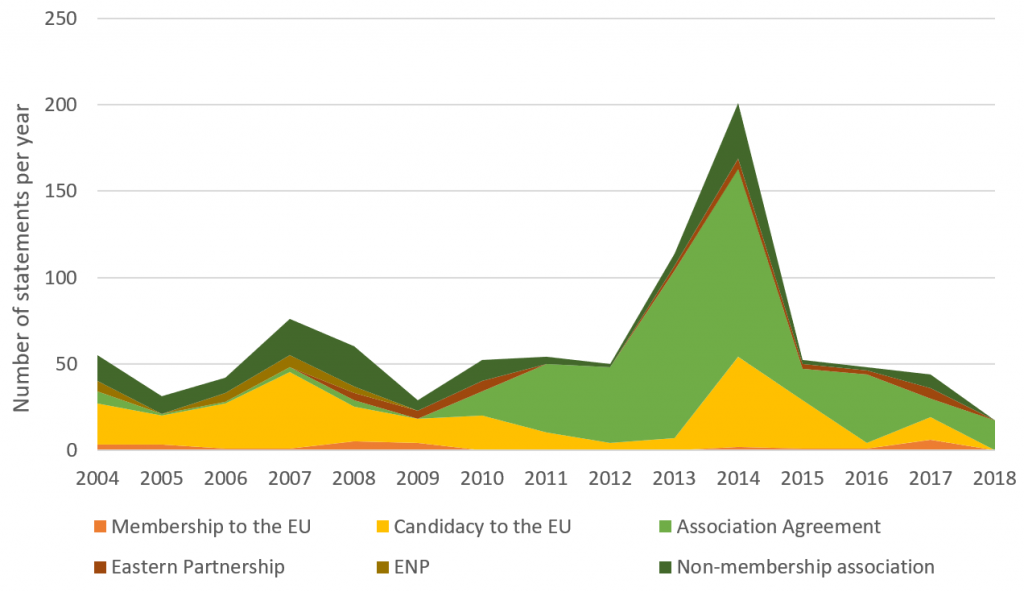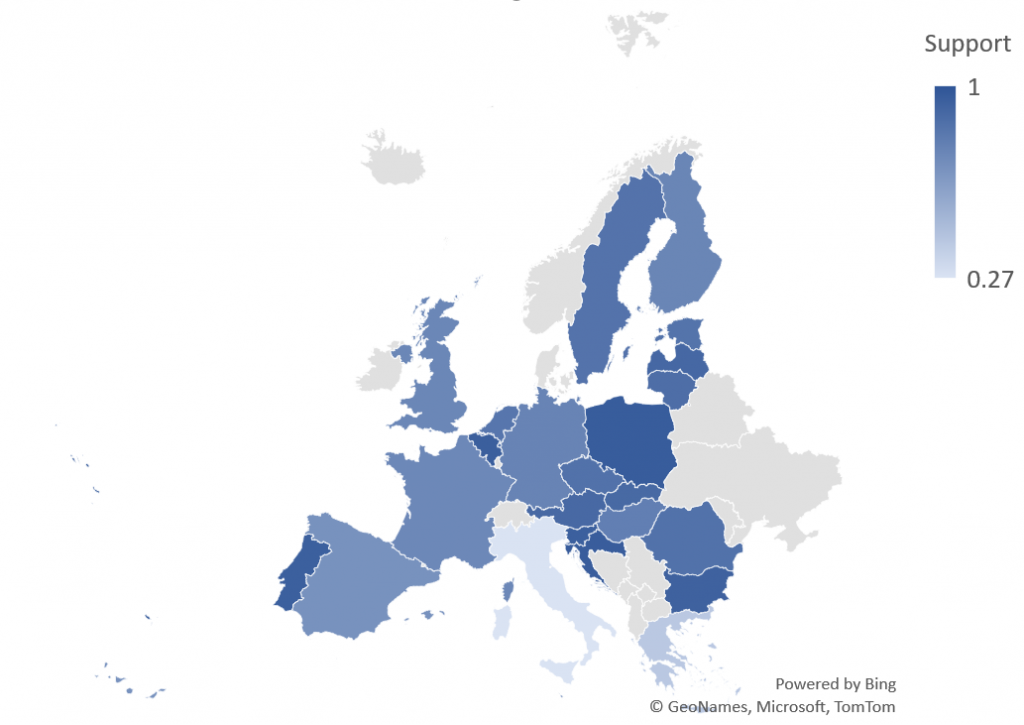Ukraine’s President, Volodymyr Zelensky, has requested that the country be allowed to join the European Union as a result of Russia’s invasion. Marie-Eve Bélanger draws on recent research to assess whether there is sufficient political support across Europe for Ukraine to be given a viable path to EU membership.
On 28 February, four days into the Russian invasion of Ukraine, the Ukrainian President, Volodymyr Zelensky, addressed the European Parliament to request the implementation of a fast-track procedure to join the European Union. Later that day, he officially signed Ukraine’s application for membership. He was quickly followed by his Georgian and Moldovan counterparts, who submitted their countries’ applications to join the bloc on 3 March.
On 6 March, Ursula von der Leyen, the President of the European Commission, noncommittedly stated that the Ukrainian people “belong in the European family”. After the Versailles summit, members of the European Council asked the European Commission to examine the new membership applications, recognizing Ukraine’s “European path”. So far, none of this has translated into a formal commitment from EU member states to accept Ukraine as a candidate for membership. So, what are the prospects for the three countries, and what can we expect in terms of support from the EU?
A fast track to enlargement?
First it must be said that an acceleration of the EU enlargement process is very unlikely. Since 1995, the EU enlargement process has systematically been getting longer with every new wave of enlargement. This is an effect of the increasingly large quantity of reforms a candidate state has to undergo before they meet European political and economic standards.
Candidate states must also adopt all European legislation – also referred to as the acquis communautaire – which includes over 60 years of common European rules and laws. This is no small task, even for advanced democracies. For reference, it took 1,431 days (almost four years) to complete the accession process leading to the 1995 enlargement for Austria, Finland and Sweden. And this was by far the shortest negotiation process in the history of EU enlargements.
Since then, the process has only been getting longer and more difficult. The 2004-2007 wave of enlargement to Eastern European countries took over ten years to be completed. And the current negotiations with Western Balkan countries are progressing very slowly. They have been plagued by repeated vetoes from certain member states, inadequate reforms in the candidate states, and enlargement fatigue among European populations.
Figure 1: EU membership has become a longer and less certain process
Note: The states that were part of each enlargement are as follows: 1973 (Denmark, Ireland, and the United Kingdom); 1981 (Greece); 1986 (Portugal and Spain); 1995 (Austria, Finland, and Sweden); 2004 (Cyprus, Czech Republic, Estonia, Hungary, Latvia, Lithuania, Malta, Poland, Slovakia, and Slovenia); 2007 (Bulgaria and Romania); 2013 (Croatia). The list of current candidates and potential candidates includes Albania, Bosnia and Herzegovina, Kosovo, Montenegro, North Macedonia, Serbia, and Turkey.
North Macedonia, for instance, submitted its application for membership in March 2004, but only started to negotiate with the EU in March 2020. This means that over a period of 16 years, EU member states could not even agree on the terms and conditions for the opening of negotiations. And for the past two years, blocked by a Bulgarian veto, none of the 35 chapters of negotiations have even been opened, let alone closed. It is fair to say that North Macedonia’s membership of the EU is still years away, if it ever materialises.
The situation is even bleaker for Turkey: in its 2021 Enlargement Package, the European Commission advised that the EU is “ready to engage with Turkey in a phased, proportionate and reversible manner”, which suggests that accession is no longer guaranteed as an outcome, even several years into the negotiation process.
Zelensky’s decision to address the European Parliament
Even though enlargement is primarily a matter of international negotiations involving national and supranational executives, parliaments have the power of ratification. Accession treaties require both the consent of the European Parliament and national parliaments. The accession of new EU member states is not subject to the ordinary legislative procedure by which the European Council and the European Parliament act as co-legislators. New membership is actually ruled by an extraordinary practice, the consent procedure.
Under the consent procedure, the European Parliament cannot amend the proposal: it can only be adopted or rejected as is. Thus, support in the European Parliament must cross national and partisan lines for the accession motion to be accepted. In this sense, President Zelensky’s strategy of directly addressing the European Parliament was strategically sound: he must ensure the support of members of the Parliament for the process to move forward. Securing the support of the EP is normally the lowest hurdle as the EP has never threatened to stop an accession treaty. But it has called to stop the accession negotiations with Turkey.
Estimating support for Ukraine’s membership
As part of the European Borders Discourses Project, I have been studying (alongside my colleagues) the evolution of debates about enlargement in national parliaments and the European Parliament between 2004 and 2018. Our data shows that both national parliaments and the European Parliament have been reliable supporters of the integration of Ukraine into the EU. This applies equally to the implementation of the Eastern Partnership in 2007, and the ratification of the Association Agreement in 2017.
Figure 2: Salience of Ukraine in statements made at the European Parliament
Source: Compiled by the author as part of the European Borders Discourses Project.
But even more interestingly, the salience of Ukrainian issues in each of the parliaments significantly increased in times of crisis. Notably, discussion over Ukraine’s integration peaked right before and during the Georgian crisis (2008) and the Euromaidan and Crimean crises (2013-2014).
So, crises act as accelerators for discussions about integration, even more so than the actual process of integration, which garners a lot less interest outside moments of crisis. Zelensky was therefore wise to seize the opportunity of the current crisis to further Ukraine’s integration agenda. He has been discussing integration in western institutions in different venues in Europe and abroad. The momentum is certainly right to stimulate a wave of unity and support in the European Parliament.
Who supports Ukraine’s integration into the EU?
Throughout the period we studied, a clear majority of statements were in favour of further integration for Ukraine, averaging 81% over the period. Most statements referred to the Association Agreement (406 statements, 87% support), and Ukraine’s candidacy for EU membership (282 statements, 85% support), which were, during the period we studied, the next logical steps for Ukraine in its integration process.
Support for actual membership was lower both in terms of the number of statements and the percentage in favour (27 statements, 78% support), but this was still much higher than the support currently afforded to other Western Balkan states. However, support for further integration for Ukraine is not distributed equally. And in this case, the most significant variation in support is between member states: while support is high among neighbouring countries, it decreases as we move further from the EU’s eastern borders.
This is somewhat surprising given the shift that has occurred in recent decades between international and supranational divisions in European integration. Since the end of the Cold War, dividing lines over political decisions have increasingly reflected transnational ideological cleavages, rather than geography. The sharp geographical divide that exists over Ukraine is something of a rarity in modern EU politics.
An illustration of this divide came on 28 February, when the leaders of Bulgaria, the Czech Republic, Estonia, Latvia, Lithuania, Poland, Slovakia, and Slovenia called to immediately grant Ukraine the status of an EU candidate country. These close neighbours average 90% support for implementing deeper levels of integration with Ukraine in parliamentary debates, even peaking at 96% in the case of Poland. There we find great unity among members of parliament across time and from all political allegiances over the issue. This is striking given the increasingly polarised nature of political spaces.
Figure 3: Average support for the further integration of Ukraine in statements made by members of national parliaments and the European Parliament
Note: The figure indicates the percentage of statements made by parliamentary members about Ukraine’s integration into the EU that were supportive of further integration.
There are three main reasons for this geographic division of support, which are all solidly anchored in national, rather than European, interests. First, Ukraine’s neighbouring states have greater interdependence: neighbouring countries share more economic, cultural and historic ties than other countries, and they depend more on each other for economic and social stability.
Second, there is security: as countries have integrated into the European Union, their national borders have become European borders, which means costly new investments in border infrastructure and personnel, not to mention the burden of protecting Europe. A new member state to the East would push this border away and create a secure zone between internal and external spaces for older member states. Third, there is influence: as new countries join the EU to the East, the centre of the political organisation will also move eastwards, spreading influence more evenly across European regions.
This means Ukraine has some strong allies on its western borders. As a group, they can mobilise significant political clout in lobbying for Ukraine’s membership of the EU. There is, however, evidence of some pushback: France and Germany have already tried to cool the expansive ambitions of their eastern partners. France currently holds the rotating presidency of the EU, and it might try to stall the process until the stakes are not so pressing, in the hope of keeping Ukraine’s neutrality as a negotiation chip with Russia.
On the other hand, the EU might not be able to ignore the strong symbolism of extending a democratic hand to one of the last non-EU European countries that is currently under attack by an authoritarian power. A lack of solidarity in this case could affect the credibility of the EU as a regional power, which has already been undermined by democratic backsliding among member states and the hesitancy of the EU to continue its expansion.
If the EU decides to go ahead with a first step, such as granting Ukraine candidate status, it will also be expected to pick up the speed of negotiations in the Western Balkans. So, is this an opportunity for European leaders to finally realise the European unification project, or will this prove too ambitious amidst war and a possible economic and energy crisis on the continent? It is too early to tell, but certainly the decisions taken in the next few days and weeks will prove critical in shaping the future of EU enlargement.




